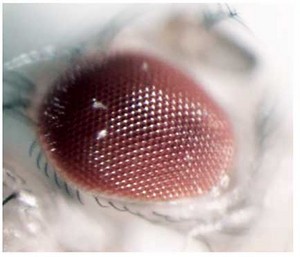Industry News
Study Reveals Eye Colour Genes Are Critical For Retinal Health
 Researchers from the Max Planck Institute of Molecular Cell Biology and Genetics (MPI-CBG) in Dresden, Germany have discovered the critical role of the Kynurenine pathway in maintaining retinal health under stress conditions. The Kynurenine pathway is a metabolic pathway that regulates a variety of biological processes and disruptions can result in toxic or protective metabolites. The team led by Elisabeth Knust used fruit flies as a model system to investigate the role of individual metabolites in retinal health.
Researchers from the Max Planck Institute of Molecular Cell Biology and Genetics (MPI-CBG) in Dresden, Germany have discovered the critical role of the Kynurenine pathway in maintaining retinal health under stress conditions. The Kynurenine pathway is a metabolic pathway that regulates a variety of biological processes and disruptions can result in toxic or protective metabolites. The team led by Elisabeth Knust used fruit flies as a model system to investigate the role of individual metabolites in retinal health.
Metabolic pathways consist of a series of biochemical reactions in cells that convert a starting component into other products. There is growing evidence that metabolic pathways coupled with external stress factors influence the health of cells and tissues. Many human diseases, including retinal or neurodegenerative diseases, are associated with imbalances in metabolic pathways.
The team found that one metabolite, 3-hydroxykynurenine (3OH-K), is harmful to the retina. However, they also discovered that the degree of retinal degeneration is influenced by the balance between toxic 3OH-K and protective metabolites, such as Kynurenic Acid (KYNA), and not just by their absolute amounts. The team also fed two of these metabolites to normal flies and found that 3OH-K enhanced stress-induced retinal damage, whereas KYNA protected the retina from stress-related damage. This means that the ratio of metabolites of the Kynurenine pathway can be altered to improve retinal health in certain conditions.
Moreover, by targeting four distinct steps within the pathway, the team demonstrated that not only the accumulation of 3OH-K but also its location in the cell and hence its availability in further reactions is crucial for retinal health. The results showed that the Kynurenine pathway is not only important in pigment formation but that the level of individual metabolites plays an essential role in maintaining retinal health.
Elisabeth Knust, who supervised the study, said, “In the future, the ratio of the various metabolites and the specific sites of their accumulation and activity should be taken into account in therapeutic strategies for diseases with impaired Kynurenine pathway function, observed in various neurodegenerative conditions.”
The study was published in the journal Plos Genetics and provides valuable insights into the role of metabolic pathways in maintaining cell and tissue health under stress conditions.



